初中英语中考时态复习
中考英语八大时态总结

中考英语八大时态总结,掌握英语谓语形式一、英语时态名称的记忆时态一般进行完成过去一般过去时过去进行时过去完成时现在一般现在时现在进行时现在完成时将来一般将来时将来进行时将来完成时过去将来一般过去将来时(略)(略)二、英语时态形式的记忆:(以动词work为例)时态一般进行完成过去现在将来过去将来workedwas/wereworkinghadworkedworkworksam/is/areworkinghave/hasworkedshall/wil lworkshall/willbeworkingshall/willhaveworkedshould/wouldwork(略)(略)可以分两个步骤记忆:1、一般现在时:work(当主语是第三人称单数时,谓语动词也要用第三人称单数形式。
)现在进行时:be+working(be随主语人称和数的变化而变化。
)现在顺利完成时:have+worked(have随主语人称和数的变化而变化,worked就是work的过去分词。
)这三种基本时态形式坐落于时态表的中心边线,就是必须首先忘记的。
其它形式可以推论而出来。
2、记住了上面三种时态的形式后,可以设想把时间提前至过去,这三种时态的形式就相应地左移一格成为一般过去时:worked(worked是work的过去式);过去进行时was/were+working;过去完成时had+worked(worked是work的过去分词)。
把时间错后至将来,这三种时态的形式也就适当地右移一格沦为通常将来时:shall/will+work;将来进行时:shall/will+beworking;将来顺利完成时:shall/will+haveworked。
(shall仅用作主语就是第一人称时,will可以用作主语就是任何人表示时。
)当然,根据shall/will的用法建议,紧随其后的动词或助动词必须用原形形式。
简而言之,把这三种现在时态形式左移变成三种过去时态形式,只需把第一个动词变成过去式即可(一般现在时谓语只有一个动词,也可把它看成为第一个动词)。
初中英语-中考时态复习-公开课精品课件-八大时态完整版

often,always,usually,sometimes, every day/week/month/year...
习惯活动 现在情况 客观事实 主将从现
I get up at six every morning. They are very busy. He needs help.
当主语不是第三人称单数时:
• 肯定句 :主语+动词原形+其它 • 否定句 :主语+don't+动词原形+其它 • 一般疑问句: Do+主语+动词原形+其它 • 特殊疑问句:特殊疑问词+一般疑问句 注意★:句式结构错则全句都错。 • 谓语动词的形式:do/does • 助动词的形式:don't(do not)/doesn't(does not)
英语时态复习
初中阶段应掌握的时态共有八种:
一般现在时、一般过去时、一般将来时 现在进行时、现在完成时 过去进行时、过去将来时、过去完成时
在英语语法中,"时"指动作发生的时间,"态"指动作的样子和状态。
一般现在时 Present Simple
What does he/she often do? What do they often do?
肯定式 I work. You work. We work. They work. He works.
疑问式
否定式
疑问否定式
Do I work?
I don't work.
Don't I work?
Do you work? You don't work. Don't you work?
2024年中考英语语法复习+—现在完成时课件

Have you seen the doctor? 你看过医生了吗?
在现在完成时中,当主语是I/you/we/they时,助动词用 have;当主语是第三人称单数时,助动词用has。
三、现在完成时的使用
1.表示过去发生并结束的动作对现在所产生的影响
He has left the city. 他已离开了这个城市。(结果:他不在这个城市。)
一、基本构成:have/has+done
I have finished my homework. 我已完成了作业。 (这里的finished就是动词finish的 过去分词。)
二、现在完成时不同人称的用法 I have washed my car.我洗过车子了。
We have done the whole work.我们干完了所有活儿。
A.practised
B.were practising C.have been practising
C
3 . —Where is mother?
—She is in the kitchen. She ________ the
housework all morning.
A.is doing
B.was doing
B.was studying
C.studied
D.have been studying
D
15 . “I _____ as everyone expects ”, Yao Ming
said .
A.haven’t played
B.haven’t been playing
C.didn’t play
D.am not playing
初中英语2024届中考语法复习一般现在时和一般将来时知识讲解
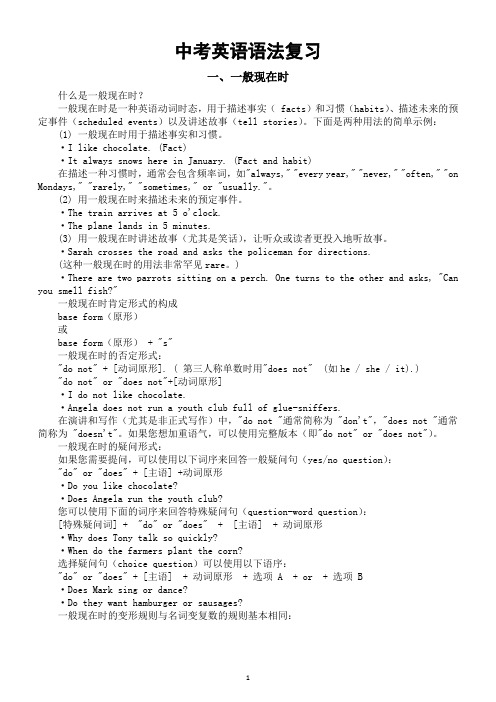
中考英语语法复习一、一般现在时什么是一般现在时?一般现在时是一种英语动词时态,用于描述事实( facts)和习惯(habits)、描述未来的预定事件(scheduled events)以及讲述故事(tell stories)。
下面是两种用法的简单示例:(1) 一般现在时用于描述事实和习惯。
·I like chocolate. (Fact)·It always snows here in January. (Fact and habit)在描述一种习惯时,通常会包含频率词,如"always," "every year," "never," "often," "on Mondays," "rarely," "sometimes," or "usually."。
(2) 用一般现在时来描述未来的预定事件。
·The train arrives at 5 o'clock.·The plane lands in 5 minutes.(3) 用一般现在时讲述故事(尤其是笑话),让听众或读者更投入地听故事。
·Sarah crosses the road and asks the policeman for directions.(这种一般现在时的用法非常罕见rare。
)·There are two parrots sitting on a perch. One turns to the other and asks, "Can you smell fish?"一般现在时肯定形式的构成base form(原形)或base form(原形) + "s"一般现在时的否定形式:"do not" + [动词原形]. ( 第三人称单数时用"does not" (如he / she / it).)"do not" or "does not"+[动词原形]·I do not like chocolate.·Angela does not run a youth club full of glue-sniffers.在演讲和写作(尤其是非正式写作)中,"do not "通常简称为 "don't","does not "通常简称为 "doesn't"。
最新中考英语复习:初中六大时态复习课件

20
Book P4
1. Our science teacher said that light _____much faster than sound.
A.make B. will make C.am making D.making
2. Look! Some visitors ______for the bus over there.
A. are waiting B.is waiting C.waiting
D.wait
3.--- What is your mother doing, Linda?
用法:
1. 表示过去某一时刻或过去某个阶段正在进行的事或发生的 动作。
He fell asleep when he __wa_s__r_e_a_d_i_n_g___(read). We _w_er_e__w_a_t_c_h_i_ng___(watch) TV from seven to nine last night. He was cleaning his car while I __wa_s__c_o_o_k_i_n_g____(cook).
It was a clear day and warm now in the sun . The fog cleared from her eyes .
Keep silent.
Break the silence.
The electricity is off.
初中英语中考复习时态讲解课件(共79张ppt)

一般现在时
1. 表示经常性或习惯性的动作
She does excersice everyday.
真题链接
—What do you often do at weekends?
—I often ____ my grandparents.
A. visit
B. visited
C. have visited D. will visit
Just a moment, I am washing dishes.
when
习题
Just a minute! My brother________ his car in the garden. A. washes B. is washing C. washed D. will wash
习题
---Hey, Tom. Let’s go swimming.
动词过去分词 不规则变化
speak hear see give build swim buy teach
spoken heard seen given built swum bought taught
现在完成时
already yet
1.过去发生或已完成的某一动作对现在的影响。
I have already watched this film. I haven't watched this film yet. I have already visited America. I haven't visited America yet.
A. prepares
B. is preparing
C. has prepared D. prepared
真题链接
--Mum, it's late. Why are you still here? --Dad hasn't come back yet. I ____ for him. A. am waitingB. was waiting C. waited D. had waited
中考英语时态复习教案(3篇)
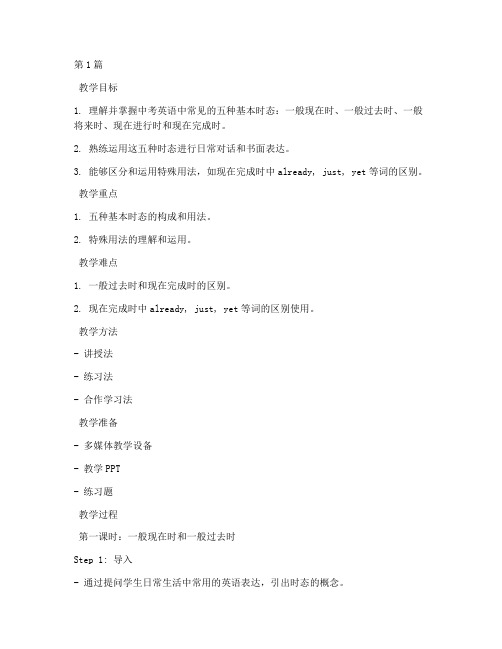
第1篇教学目标1. 理解并掌握中考英语中常见的五种基本时态:一般现在时、一般过去时、一般将来时、现在进行时和现在完成时。
2. 熟练运用这五种时态进行日常对话和书面表达。
3. 能够区分和运用特殊用法,如现在完成时中already, just, yet等词的区别。
教学重点1. 五种基本时态的构成和用法。
2. 特殊用法的理解和运用。
教学难点1. 一般过去时和现在完成时的区别。
2. 现在完成时中already, just, yet等词的区别使用。
教学方法- 讲授法- 练习法- 合作学习法教学准备- 多媒体教学设备- 教学PPT- 练习题教学过程第一课时:一般现在时和一般过去时Step 1: 导入- 通过提问学生日常生活中常用的英语表达,引出时态的概念。
Step 2: 讲解- 讲解一般现在时的构成和用法,包括表示经常性和习惯性的动作、客观真理、科学事实等。
- 讲解一般过去时的构成和用法,包括表示过去发生的动作或存在的状态、过去经常性或习惯性的动作等。
Step 3: 练习- 学生进行口头练习,如用一般现在时描述日常活动,用一般过去时描述过去发生的事情。
- 练习完成句子,如:“I ______ (go) to school by bus every day.”Step 4: 小组活动- 学生分组,进行角色扮演,用一般现在时和一般过去时进行对话。
第二课时:一般将来时和现在进行时Step 1: 复习- 复习上一课时的内容,检查学生对一般现在时和一般过去时的掌握情况。
Step 2: 讲解- 讲解一般将来时的构成和用法,包括will, be going to等结构。
- 讲解现在进行时的构成和用法,包括be动词+现在分词结构。
Step 3: 练习- 学生进行口头练习,如用一般将来时描述未来的计划,用现在进行时描述正在进行的动作。
- 练习完成句子,如:“I ______ (go) to the movies this evening.”Step 4: 小组活动- 学生分组,进行角色扮演,用一般将来时和现在进行时进行对话。
(中考英语资料)初中英语语法八大时态总结(完整版)含答案
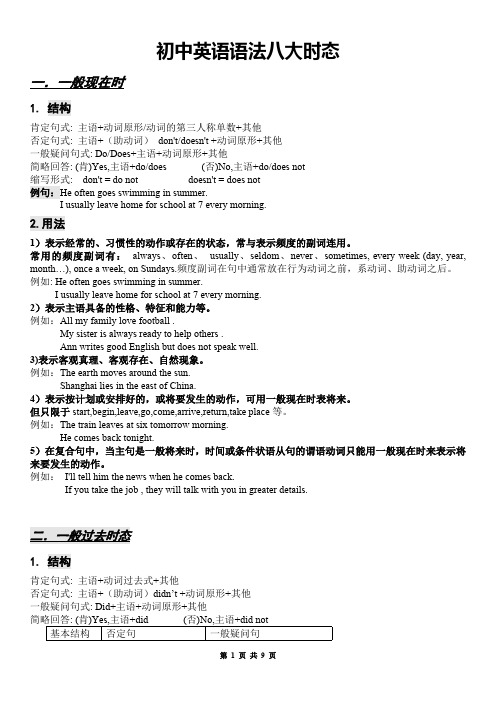
初中英语语法八大时态一.一般现在时1. 结构肯定句式: 主语+动词原形/动词的第三人称单数+其他否定句式: 主语+(助动词)don't/doesn't +动词原形+其他一般疑问句式: Do/Does+主语+动词原形+其他简略回答: (肯)Yes,主语+do/does (否)No,主语+do/does not缩写形式: don't = do not doesn't = does not例句:He often goes swimming in summer.I usually leave home for school at 7 every morning.2.用法1)表示经常的、习惯性的动作或存在的状态,常与表示频度的副词连用。
常用的频度副词有:always、often、usually、seldom、never、sometimes, every week (day, year, month…), once a week, on Sundays.频度副词在句中通常放在行为动词之前,系动词、助动词之后。
例如: He often goes swimming in summer.I usually leave home for school at 7 every morning.2)表示主语具备的性格、特征和能力等。
例如:All my family love football .My sister is always ready to help others .Ann writes good English but does not speak well.3)表示客观真理、客观存在、自然现象。
例如:The earth moves around the sun. Shanghai lies in the east of China.4)表示按计划或安排好的,或将要发生的动作,可用一般现在时表将来。
初中英语中考必会时态归纳(共16种)
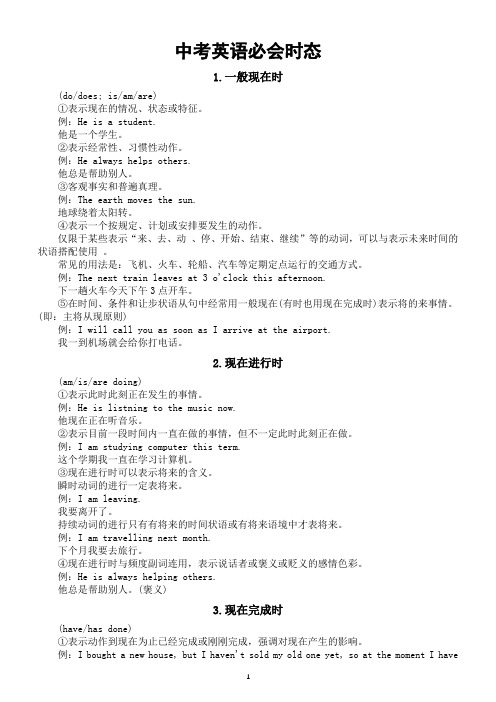
中考英语必会时态1.一般现在时(do/does; is/am/are)①表示现在的情况、状态或特征。
例:He is a student.他是一个学生。
②表示经常性、习惯性动作。
例:He always helps others.他总是帮助别人。
③客观事实和普遍真理。
例:The earth moves the sun.地球绕着太阳转。
④表示一个按规定、计划或安排要发生的动作。
仅限于某些表示“来、去、动、停、开始、结束、继续”等的动词,可以与表示未来时间的状语搭配使用。
常见的用法是:飞机、火车、轮船、汽车等定期定点运行的交通方式。
例:The next train leaves at 3 o'clock this afternoon.下一趟火车今天下午3点开车。
⑤在时间、条件和让步状语从句中经常用一般现在(有时也用现在完成时)表示将的来事情。
(即:主将从现原则)例:I will call you as soon as I arrive at the airport.我一到机场就会给你打电话。
2.现在进行时(am/is/are doing)①表示此时此刻正在发生的事情。
例:He is listning to the music now.他现在正在听音乐。
②表示目前一段时间内一直在做的事情,但不一定此时此刻正在做。
例:I am studying computer this term.这个学期我一直在学习计算机。
③现在进行时可以表示将来的含义。
瞬时动词的进行一定表将来。
例:I am leaving.我要离开了。
持续动词的进行只有有将来的时间状语或有将来语境中才表将来。
例:I am travelling next month.下个月我要去旅行。
④现在进行时与频度副词连用,表示说话者或褒义或贬义的感情色彩。
例:He is always helping others.他总是帮助别人。
(褒义)3.现在完成时(have/has done)①表示动作到现在为止已经完成或刚刚完成,强调对现在产生的影响。
初中英语八种时态基本句型及例句中考英语时态的基本结构总结归纳

初中英语八种时态基本句型及例句中考英语时态的基本结构总结归纳初中英语中,常用的八种时态基本句型及例句如下:1. 一般现在时(Simple Present Tense)句型:主语+动词原形例句:I like to play basketball.2. 一般过去时(Simple Past Tense)句型:主语+动词过去式例句:She studied hard for the test.3. 一般将来时(Simple Future Tense)句型:主语 + will + 动词原形例句:They will go to the beach next weekend.4. 现在进行时(Present Continuous Tense)句型:主语 + am/is/are + 现在分词例句:He is watching TV at the moment.5. 过去进行时(Past Continuous Tense)句型:主语 + was/were + 现在分词例句:We were playing soccer yesterday.6. 将来进行时(Future Continuous Tense)句型:主语 + will be + 现在分词7. 现在完成时(Present Perfect Tense)句型:主语 + have/has + 过去分词例句:We have already finished our homework.8. 过去完成时(Past Perfect Tense)句型:主语 + had + 过去分词例句:He had already left when I arrived.中考英语时态的基本结构如下:1. 一般现在时:主语 + 动词原形(eg. I like swimming.)2. 一般过去时:主语 + 动词过去式(eg. She studied English last night.)3. 一般将来时:主语 + will + 动词原形(eg. We will go to the park tomorrow.)4. 现在进行时:主语 + am/is/are + 现在分词(eg. They are playing soccer now.)5. 现在完成时:主语 + have/has + 过去分词(eg. She has already finished her homework.)6. 过去进行时:主语 + was/were + 现在分词(eg. I was readinga book yesterday.)7. 过去完成时:主语 + had + 过去分词(eg. We had already left when you arrived.)8. 将来完成时:主语 + will have + 过去分词(eg. They will have finished the project by next week.)。
英语中考归纳复习专题:动词的时态
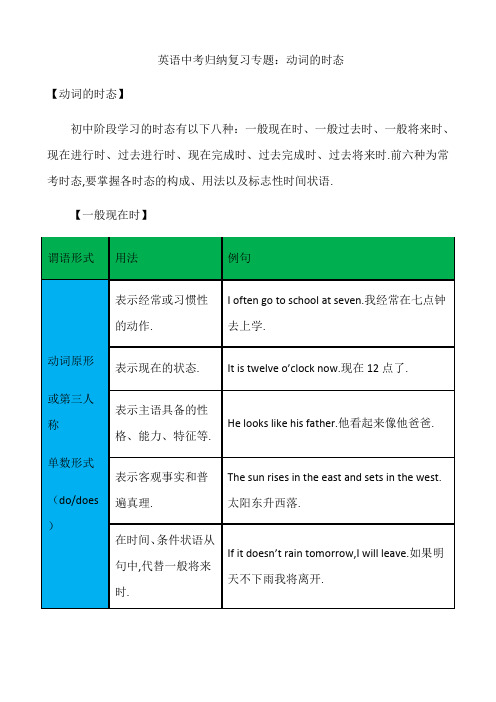
英语中考归纳复习专题:动词的时态【动词的时态】初中阶段学习的时态有以下八种:一般现在时、一般过去时、一般将来时、现在进行时、过去进行时、现在完成时、过去完成时、过去将来时.前六种为常考时态,要掌握各时态的构成、用法以及标志性时间状语.【一般现在时】【考点训练1】1.My father is a teacher and he _________ (teach) in a middle school.2.Yesterday the teacher told us the earth _______ (go) around the sun.3.—When shall we begin our meeting?—We’ll begin it when Helen ___ . ()esB.cameC.will comee4.—How do you usually go to school?—I usually ___ to school on foot. ()A.goB.wentC.was goingD.will go答案:teaches goes A A【一般过去时】要点提醒:“used to+动词原形”表示过去的习惯或状态.如:Mum used to tell us stories.妈妈过去常给我们讲故事.【考点训练2】1.Mike ________ (not go) to bed until 12 o’clock last night.2.He asked if I _____ (be) a student.3.Will you please say it again?I ___ quite ___ you.()A.don’t;hearB.didn’t;hearC.don’t;heardD.didn’t;heard4.He _____ go out with his parents,but now he ____ staying at home alone. ()ed to;is used toB.is used to;used toe to;is used toed to;used to答案:didn’t go was B A【一般将来时】要点提醒:be going to与will的区别1.be going to 指已计划好的事或思考过的意图、打算,will表示未事先思考或未计划而临时做出的决定.如:I’m going to see him tomorrow.我打算明天去看他.(事先经过思考)I’ll answer the door.我去开门.(未经事先考虑)2.be going to可表示客观迹象表明马上要发生的事,而will则表明说话者的主观意愿.如:Look at the clouds.There is going to be a storm.看看这些云,暴风雨就要来了.(客观迹象表明要发生)I hope it will be warm tomorrow.我希望明天会暖和起来.(主观意愿)3.在含有条件状语从句的复合句的主句中,一般用will,不用be going to. 如:I will come if it doesn’t rain.如果不下雨的话,我就来.【考点训练3】1.____ a concert in our school next Saturday. ()A.There isB.There areC.There will beD.There will have2.If they can arrive by 9:00 am,we ___ a meeting.()A.haveB.will haveC.hadD.would have3.He ___ her a beautiful hat on her next birthday.()A.givesB.gaveC.will givingD.is going to give答案:C B D 【现在进行时】【考点训练4】1.They ____________ (have) a math test in the classroom now.2.Look! He ___________ (lie) on the beach.3.—Pass the raincoat to me.It ___ hard now.—Here you are. ()A.rainB.is rainingC.rainedD.will rain4.—Cathy,can you answer the door?I ___ the room.—I’m coming,Mum. ()A.CleanB.cleanedC.have cleanedD.am cleaning答案:are having is lying B D【过去进行时】He was forever com plaining about something.他老是怨这怨那.要点提醒:1.在含有时间状语从句的复合句中,延续时间较长的动作常用过去进行时,另一个短暂性动作用一般过去时.如:When the UFO landed,I was shopping at the clothes store.当UFO落地时,我正在服装店买衣服.2.表示两个延续性动作在过去某一时刻同时进行,不考虑动作的先后顺序,主句和从句的谓语动词都用过去进行时,连词常用while.如:Tom was doing his homework while I was reading a newspaper.我在看报纸时,汤姆在做作业.【考点训练5】1.Mike and I ___________ (play) basketball at that time yesterday afternoon.2.While Mr.Johnson _______________ (work) in the office,the phone rang.3.The girl ___ for the bus when the rainstorm came.()A.waitedB.have waitedC.is waitingD.was waiting4.—Jenny,I called you at nine last night,but you didn’t pick up.—Oh,I ____ a popular program called Go Fighting!.()A.watchB.watchedC.was watchingD.am watching答案:were playing was working D C【现在完成时】要点提醒:1.have/has been to,have/has gone to与have/has been in(考点讲解详见P74考点1)2.延续性动词与非延续性动词英语中的动词按动作发生的方式、发生过程的长短可分为延续性动词和非延续性动词两种,非延续性动词也可称为短暂性动词或瞬间动词.在现在完成时态中,有时要将非延续性动词转换为延续性动词,这样才能和时间段连用.转换方法如下:(1)将短暂性动词转换为“be+形容词或副词”.请看下表:如:这间商店开门6小时了.The shop has opened for 6 hours.( ×)The shop has been open for 6 hours.( √)(2)有的短暂性动词可以转换为意思相同的延续性动词.请看下表:如:这本书我借了一个月了.I have borrowed the book for one month.( ×)I have kept the book for one month.( √)3.现在完成时与一般过去时的区别现在完成时强调某一动作或状态对现在造成的影响或结果,不能和表示过去的时间状语连用;一般过去时只表示过去的事实,不表示和现在的关系,可以和表示过去的时间状语连用.如I bought a ticket yesterday.我昨天买了一张票.(强调我昨天做的一件事是买票)I have already bought a ticket.我已经买了一张票.(强调我已经有票了,无须再惦记票的事了)4.现在完成时的其他句型【考点训练6】1.—you _____ your homework yet?—Yes.I ______ it a moment ago. ()A.Did;do;finishedB.Have;done;finishedC.Have;done;have finishedD.Will;do;finish2.His father ___ the Party since 1978. ()A.joinedB.has joinedC.was inD.has been in3.Miss Green isn’t in the office.She to the library. ()A.has goneB.wentC.will goD.has been 答案:B D A【过去完成时】had + 过去分词表示在过去的过去发生的动作或存在的状态.I had had three pieces of cake when you arrived.你来的时候我已经吃了三块蛋糕了.表示过去某一动作或状态持续到过去另一时间.The old man had lived in Shanghai for ten years beforeTom came here.汤姆来这儿之前,这个老人已经住在上海十年了.时间标志by the time...,before,when等构成的短语或引导的从句【考点训练7】1.在我们到达电影院之前,电影已经开始了.The film __________ before we _______ to the cinema.2.警察赶到时,小偷已经逃跑了.When the police __________,the thief____________________ .答案:had begun got arrived had run away 【过去将来时】【考点训练8】1.李明说如果布莱恩下个月来中国,他将会很高兴.Li Ming said he ___________ happy if Brian came to China the next month.2.蒂娜说她下周三打算来参加我的生日派对.Tina said she ________________ my birthday party the next Wednesday.答案:would be was going to【中考示例】(2017·广西)If he _____ Guilin,he’ll probably go to Yangshuo. ( )A.visitsB.is visitingC.will visitD.has visited【解析】考查动词的时态.句意:如果他游览桂林,他有可能会去阳朔.if引导条件状语从句时,时态遵循“主将从现”原则,从句中用一般现在时表示将来.【考题热身】1.(2017·甘肃)I promise I ________ (send) you an email to explain all of these tomorrow.2.(2017·甘肃)Be quiet! The patients ______________(sleep).3.(2017·鄂州)Sandy’s grandparents__________________ (marry) for 50 years.4.(2017·台州改编)A true friend always ____________(support) you whenever youare in trouble.5.(2017·宿迁)I ______________(wash) the dishes while my sister was sweeping the floor.6.(2017·云南)—What do you think of your hometown, Kate?—It a lot.It’s more beautiful than before. ()A.has changedB.changesC.will changeD.change7.(2017·武汉)—Linda is not coming for the party tonight.—But she ______!()A.promisesB.promisedC.will promiseD.had promised8.(2017·毕节)It’s nice to see you again.We ___ each other since 2016. ()A.won’t seeB.haven’t seenC.don’t seeD.didn’t see9.(2017·黔东南)If it doesn’t rain this weekend,we ___ a picnic in the Jinquan Park. ()A.haveB.will haveC.have hadD.had10.(2017·上海)Some exchange students ___ with their host families this time yesterday. ()A.are chattingB.will chatC.were chattingD.have chatted11.(2017·重庆B卷)—Where is your uncle?I haven’t seen him for a long time. —He _____ Beijing for about half a year.He moved there in January. ()A.has gone to B.has been toC.has arrived inD.has been in12.(2017·重庆B卷)John and I ___ to visit his grandparents last Sunday afternoon. ()A.goB.wentC.will goD.have gone13.(2017·重庆A卷)In the past few years,many schools ____ the ways of doing morning exercises. ()A.changeB.changesC.will changeD.have changed14.(2017·重庆A卷)As soon as the rain _____ ,they will go out to pick apples. ()A.stopsB.stoppedC.will stopD.is stopping15.(2017·河北)Don’t take the dictionary away.I ___ it. ()eedC.am usingD.have used答案:will send are sleeping have been married supports A B BBCDBDAC。
初中英语2024届中考语法复习时态专项练习(真题再现+强化训练)(附参考答案和解析)

中考英语时态专项练习班级考号姓名总分【真题再现】一、1.I scared of dogs ever since i dog hurt me when I was five years olD.(浙江杭州)A.will beB.wasC.have beenD.would be2.My grandparents for over 60 years and they love each other very much.(江苏宿迁)A.have been marriedC.were marriedB.got marriedD.have got married3.Please wait.She to you in a few minutes.A.TalkB.talkedC.have talkedD.will talk(重庆)4.-Cathy, can you answer the door? I the room.-I'm coming,Mum. (安徽)A.cleanB.cleanedC.have cleanedD.am cleaning5.-When shall we begin our meeting?-We'll begin it when Helen . (重庆)esB.cameC.will comee6.Stop smoking, Joe! You yourself if you keep on doing it like that! (重庆)A.will killB.have killedC.killD.killed7.Hurry up! Mark and Carl us. (北京)A.expectB.are expectingC.have expectedD.will expect8.-I went to visit you yesterday evening,but you weren’t in.Where were you then?-Oh,I my pet dog in the park.I_this dog for three days and it’s very cute.(四川凉山)A.was walking;have hadB.walked; boughtC.was walking; have boughtD.walked; have had9.-When will Uncle Sam come to see us?-He'll visit us this weekenD.He me that by e mail. (江苏南京)A.toldB.is toldC.will tellD.was going to tell10.Neither the headmaster nor the teachers take a vacation next week.(内蒙古呼和浩特)A.were going toB.is going toC.was going toD.are going to11.In the past few years, great changes in Lianyungang. (江苏连云港)A.take placeB.took placeC.have taken placeD.have been taken place12.-Look at the sign!It says“No Smoking”.-Oh, sorry. it. (山东滨州)A.don't seeB.haven't seenC.wasn't seenD.didn't see13.-Tom, you ever_that new film?-Yes, I it a week ago. (四川广安)A.have; seen; sawB.have; seen; seeC.do; see; seeD.had; seen; saw14.-Our classmates went to a concert yesterday afternoon.-What a pity! I my homework. (山东泰安)A.had doneB.was doingC.am doingD.would do15.I the book Little Women,but I'll let you read it first. (四川成都)A.haven't readB.don't readC.won't read二、根据句意,用括号内所给单词的适当形式填空。
初中英语动词时态总复习(超级精华版)

2. 过去将来时的用法 : 1)表示从过去某时看将要发生的动作或存在的状态。常用于主句是一般过去时的宾语从句中。 例如:He said that he would finish his work before 9 o’clock. 他说他会在九点之前完成工作。 2)“was/were going to+动词原形”所表示的过去将来时,表示过去曾经打算或将要做某事。 例如:She said she was going to buy a car. 她说她打算买一辆小汽车。
01
02
1.改为一般疑问句并回答。
Yes, I will./No, I won't. I won't do my homework tonight.
I will do my homework tonight. Will you do your homework tonight?
2.改为否定句。
句型转换
表示在过去,经常或反复发生的动作。常与often,always等表示频度的副词连用。
01
例如:
02
When I was a child, I often played football in the street.
03
我是个孩子的时候,常在马路上踢足球。
04
例如:Did you see him today?
1.改为一般疑问句并回答。
01
句型转换
1.改为一般疑问句并回答。
2.改为否定句。
Jim does his homework every day. Does Jim do his homework every day?
Yes, he does./No, he doesn't. Jim doesn't do his homework every day.
初中英语中考必考时态结构及用法详解(共八种)
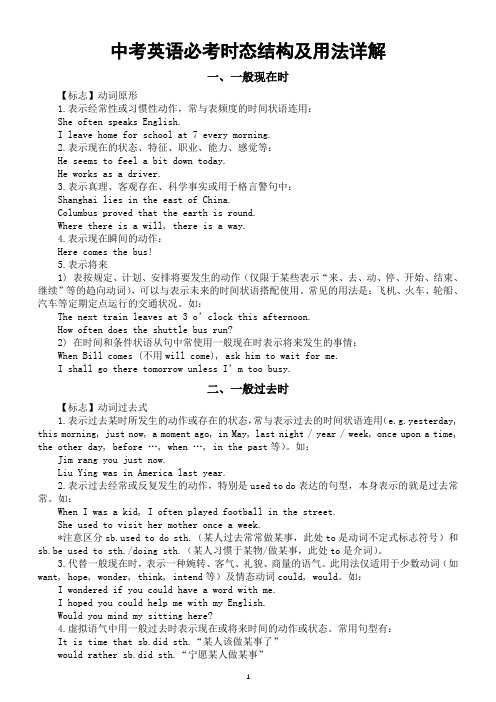
中考英语必考时态结构及用法详解一、一般现在时【标志】动词原形1.表示经常性或习惯性动作,常与表频度的时间状语连用:She often speaks English.I leave home for school at 7 every morning.2.表示现在的状态、特征、职业、能力、感觉等:He seems to feel a bit down today.He works as a driver.3.表示真理、客观存在、科学事实或用于格言警句中:Shanghai lies in the east of China.Columbus proved that the earth is round.Where there is a will, there is a way.4.表示现在瞬间的动作:Here comes the bus!5.表示将来1) 表按规定、计划、安排将要发生的动作(仅限于某些表示“来、去、动、停、开始、结束、继续”等的趋向动词),可以与表示未来的时间状语搭配使用。
常见的用法是:飞机、火车、轮船、汽车等定期定点运行的交通状况。
如:The next trai n leaves at 3 o’clock this afternoon.How often does the shuttle bus run?2) 在时间和条件状语从句中常使用一般现在时表示将来发生的事情:When Bill comes (不用will come), ask him to wait for me.I shall go there tomorrow unless I’m too busy.二、一般过去时【标志】动词过去式1.表示过去某时所发生的动作或存在的状态,常与表示过去的时间状语连用(e.g.yesterday, this morning, just now, a moment ago, in May, last night / year / week, once upon a time, the other day, before …, when …, in the past等)。
中考英语总复习之初中英语时态表
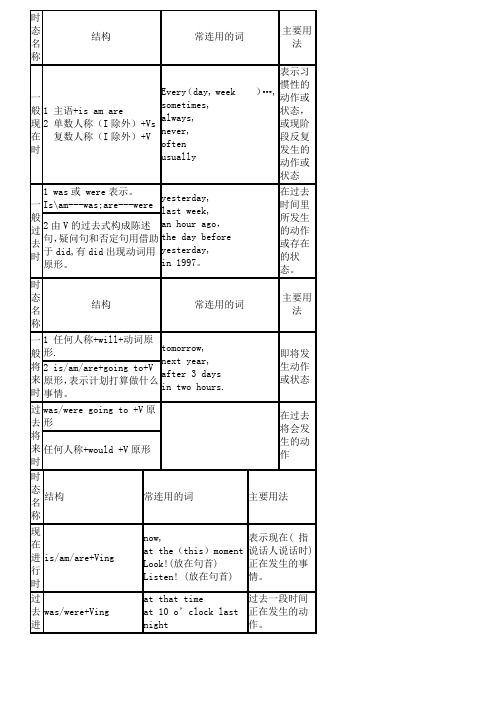
last week,
an hour ago,
the day before yesterday,
in 1997。
在过去时间里所发生的动作或存在的状态。
2由V的过去式构成陈述句,疑问句和否定句用借助于did,有did出现动词用原形。
时态名称
结构
常连用的词
主要用法
一般将来时
1任何人称+will+动词原形.
主要用法
现在进行时
is/am/are+Ving
now,
at the(this)moment
Look!(放在句首)
Listen! (放在句首)
表示现在(指说话人说话时)正在发生的事情。
过去进行时
was/were+Ving
at that time
at 10 o’clock last night
at that moment等过去具体的时间
I have been toCanada. Have you been to Hongkong?
Where have you been? I have never been here
2.have/hasg.
They have gone to the cinema.
过去一段时间正在发生的动作。
现在完成时
have/has +done(过去分词)
already;
just(not just now)
yet;ever;never;
for two weeks;
for a year;
for several days;
since 2004
since last week
中考英语时态练习100题(答案)

初中英语时态练习100题(中考复习适用)1.I will tell him as soon as he _____ backA. comeB. comesC. will comeD. came2. Mary _____ on shoes when she ____ them.A. tries…buysB. tries… buiesC. trys… buysD. trys… buies3. The girl often ______ cold when she ______.A. cathcs…dancesB. catches… dancesC. catchs…danceesD. catches… dancee4. _____ he ____ himself there? No, I don't think so.A. Do…enjoyB. Does… enjoiesC. Does… enjoysD. Does…enjo y5. _____ your teacher ____ from them very often? Certainly.A. Do…hearB. Does…hearC. Do… receiveD. receive6. _____ your mother _____ some cleaning on Sundays?A. Does…doesB. Do…doesC. Does…doD. Do… d o7. _____ T om _____to work hard to help his family ? Yes, he _____.A. Has… x…doesB. Has…x…doesC. Does…has…hasD. Does… have…does8. Which teacher _____ lessons to you every day ?A. does …givesB. does… giveC. do… giveD. gives9. Smith does not go fishing on weekdays, ____? _____ , he does.A. does he…NoB. does he…YesC. doesn't he…NoD. doesn't he…Yes10.Mr Black often _____ fishing on Sundays, _____ he ?A. goes…doesn'tB. goes…isn'tC. doesn't go…doesD. doesn't go…is11.He usually _____ TV on Sunday evening.A. watchB. watchesC. watchingD. is watching12. We'll go to play with snow if it ______ tomorrow.A. snowB. snowsC. will snowD. snowed13. Neither I nor he ______ French.A. speakB. doesn't speakC. speaksD. doesn't speak14. Nobody ______ how to run this machines.A . know B. have known C. knows D. is knowing15. The Young Pioneer _____ water for the old man every day.A. carryB. bringC. takesD. carries16. Some are ______ in the river and some are ______ games.A. swimming… playingB. swimming…plaiingC. swimming… I playingD. sw imming…plaing17. Look ! The boy students are _____ football while the girls are _____ .A. playing… danceB. playing… dancingC. play… dancingD. play… dance18. He _____ to do his lessons at eight every evening.A. is beginningB. is beginningC. beginD. begins19. _____ he _____ on well with his friends this term ?A. Does…getsB. Does…getC. Is…gettingD. Is…geting20. Mr Smith _____ short stories, but he ____ a TV play these days.A. is writing…is writ ingB. is writing… writesC. writes… is writingD. writes… writes21. I _____ to the cinema. I ______ there every Sunday.A. go…goB. am going… goC. go… am goingD. am going…am going22. Look, they______ a good time, ____ they ?A. have…doB. have…don'tC. are having…areD. are having… aren't23. You ______ about the future now, ______ you ?A. don't think…don'tB. aren't thinking… aren'tC. don't think… doD. aren't thinking… are24. She always ______ something whenever she ______.A .studied…played B. studied…plaied C.. studied…plaied D. studied… played25. He often _____ late in the forest. It _____ me very much.,A. stayed…worriedB. staied… worriedC. stayed…wor ryedD. staied… worried26. I ______that the boy _____ with no tears in his eyes.A. noticed… cryedB. noticed… criedC. noticed…criedD. noticed… cryed27. We _____the floor and _____ all the windows.A. mopped… cleannedB. moped… cl eanedC. mopped…cleanedD. moped… cleaned28. When I _____ the Children's Palace, the children _____ with joy.A. visited… jumpedB. visited… jumpedC. visited… jumpedD. visited… jumpped29. ______ a sports meet last Sunday ? Yes , they ______.A. Did they have... did B. Did they have... had C. Had they... had D. Had they (i)30. ____ you _____out for a walk after supper ? Yes, I ______.A. Did...went...went B. Did... go... went C. Did... went... did D. Did... go (i)31. _____ Jack _____ on with his work or ______ to have a rest?A. Did… went… stoppedB. Did… go… stopC. Did… went… stopD. Did… go… stopped32. You gave them a talk two days ago, _____you ? Yes, I ______.A. did… didB. did… gaveC. didn't… didD. didn't… gave33. ____ your brother _____ a letter to ? My father.A. Who… wroteB. What…wroteC. Who did…writeD. What did… write34. They _____ about the TV news then in the sitting-room. They often ____ such talksA. talked…hadB. talk…haveC. were talking…hadD. are talking…have35. He ______ some cooking at that time, so _____ me.A. did… heardB. did… didn't hearC. was doing… heardD. was doing… didn't hear36. " _____ you angry then?" "They_ too much noise.”A. Are…were makingB. Were…were makingC. Are…madeD. Were… made37. This time yesterday Jack _____ his, bike. He _____ TV. A. repaired… didn't watchB. was repairing… watchedC. repaired… watchedD. was repairing… wasn't watching38. We _____ for Tom at ten last Sunday. He often kept us ______.A. were waiting… waitingB. were waiting… waitC. waited… waitingD. wai ted… wait39. When you _____ at the door, I _____ some washing.A. knocked… didB. was knocking… didC. knocked… was doingD. knock… am doing40. The boy_____ English on the radio when I _____ his door.A. learned… was openingB. was learning… openedC. learned… openedD. is learning… open41. When they______ through the forest, a bear _____ at them.A. walked… was comingB. were walking… cameC. were talking… comesD. walk… is coming42. A young man _____ her while she _____ her work . A. watched… was finishingB. was watching… finishedC. watched… finishedD. was watching… was finishing43. While mother _____ some washing, I ______ a kite for Kack.A. did… madeB. was doing… madeC. was doing… was makingD. did… was making44. I _____ myself French from 7 to 9 yesterday morning. I _____ to work.A. was teaching… didn't goB. taught… didn't goC. was teaching… wentD. taught… went45. He _____ a model plane when I came to see him.A. makesB. is makingC. was makingD. made46. I ______ a letter at nine last night.A. is writingB. was writingC. wroteD. is writing47. The teacher_____ (give) us a history lesson when Tom walked into the classroom.A. gaveB. is givingC. was givenD. was giving48. There will be a football match in two days, that is _______.A. last SundayB. next SundayC. every SundayD. this Sunday49. We ______ class meeting this November.A. hadB. haveC. will haveD. are having50. He ______ in his garden every morning next year.A. will workB. worksC. workedD. is working51. Be careful. The train ______.A. will comeB. cameC. comesD. is coming52. Look at those clouds. It _____ soon, I'm afraid.A. is going to rainB. is rainingC. will rainD. won't rain53. The radio says it ______ the day after tomorrow.A. is going to snowB. is snowingC. will snowD. snows54. _____ he _____ some shopping tomorrow afternoon ?A. Will…doesB. is going to doC. is…doingD. Shall… do55. What day _____ it ______ tomorrow ? Wednesday.A. is… going to beB. will…beC. shall…beD. does…be56. The boy _______ sixteen years old next year.A. is going to beB. is growing to beC. will beD. is57. _____ you ____ me up at six, please ?A. Are…going to wakeB. Are…wakingC. Will…wakeD. Do…wake58. If he ______ to college, he _____ a lot more.A. will go…will learnB. will go…is going to learnC. is going… is going to learnD. goes… will learn59. When she _____ next time ,l ______ her everything.A. is going to come…shall tellB. will come…shall tellC. comes…will tellD. come…will tell60. What day ____ it ____ tomorrow ? It ____Tuesday.A. is…going to be… isB. will…be…willC. i s…going to be…is goingD. will be…will be61. She _____that she _____ her best to help them the next term.A. says…will doB. said…will doC. said… would doD. says…would do62. People _____ that the Smiths _____ for a holiday next week.A. say… will goB. said… will goC. said… would goD. say…would go63. Nobody _____ us that he _____ even stricter with usA. tell…will beB. tells…would beC. told…will beD. told…would be64. Please _____ him that we _____ able to help him.A. tell…will beB. tells… would beC. told…will beD. told… would be65. Jack _____ that they _____ surprised to see it this Friday.A. know… would beB. knows… will beC. knew… would beD. knew… will be66. I _____to know if Mary_____ by train that afternoon.A. want… would goB. want… will goC. wanted… would goD. wanted… will go67. _____ he _____ that they _____ home tomorrow? A. Does… learn… would goB. Does… learn… will goC. Did… learn… would goD. Did… learn… will go68. We _____ that they _____ a sports meet tomorrow.A. learn… would haveB. have learned… would haveC. learn… will haveD. have learned… will have69. ____ you _____ that he _____ his lost son one day ? A. Do…think…will findB. Do…thought…would findC.Did…think…will findD.Did…thought…would find70. I _____ that you _____ good care of her that day.A. thought…will takeB. thought…would takeC. think… will takeD. think… would take71. The visitors _____ where they _____ a short test.A. ask… would takeB. ask… will takeC. asked… would takeD. asked… can take72. John ____ sure that he ____ good at chemistry soon.A. be… will beB. is, would beC. was… will b eD. was… would be73. She ____ ill so she ____ able to go skating the next day.A. is… won't beB. is… wouldn't beC. was… won' beD. was… wouldn't be74. He _____ the thief to the police when he _____ the man again.A. would take… would meetB. would take…metC. will take… will meetD. will take… meet75. Mother ____ me a new coat yesterday, I _____ it on. It fits me well.A. has made…have triedB. made…have triedC. has made…triedD. made…tried76. " He ____ to draw ho rses already ."" When ____he ?”. " Last year. "A. learned...has B. learned...did C. has learned...has D. has learned (i)77. Tom ____ up into the tree. Look, he _____ high up there !A. has got… isB. has climbed… wasC. got… wasD. climbed… is78. _____you _____ the text yet ? Yes, we _____ it two hours ago.A. Did…copy…didB. Have… copied…haveC. Have… copied… didD. Did …copy…had79. "Why she angry?" "Because he _____ at he just now.A. did… get, shoutedB. has…got…shoutedC. did… get… has shoutedD. has…got…has shouted80. _____ you ______ the film before ? Where ____ you _____ it ? A. Have… seen… did… seeB. Did…see…die…watchC. Have…seen… have… seenD. Did…see…have…seen81. You _____ me waiting for two hours. I _____ for you since five.A. Kept…waitedB. have kept…waitedC. kept…have waitedD. have kept…have waited82. Where _____John _____? To the library. He _____ there for an hour.A. has… been … has goneB. has…gone…has beenC. did… go… wentD. did…be…went83. _____ the baby still _____ ? No, it ______ crying. A. Has… cried… has stoppedB. Is…crying…stoppedC. Did… cry… stoppedD. Is…crying…has stopped84. I _____ the way. I ______ here for quite many years.A. knew... have lived B. knew... live C. know... have lived D. know (iv)85. _____ you ever _____America ? Yes, I have.A. Have… gone toB. Have… gone inC. Have… been toD. Hav e… been in86. My brother _______ college for over three years.A. has gone toB. has been toC. has been inD. has been for87. He _____ the Army by the end of 1992. He ____ in the army since then.A. joined…isB. has joined…has bee nC. had joined…isD. has joined… has been88. By the time I _____ back they ____ up ten metres.A. came…have climbedB. came…had climbedC. come…have climbedD. had come…climbed89. Jack ____ over five lessons by seven o'clock. Then he____ a test.A. went…tookB. went…had takenC. had gone…tookD. had gone…had taken90. We _____ out by that time that he ____ a thief for a long time.A. had found…had beenB. had found…wasC. found…had beenD. found…was91. Before the new _____ him, he ____ to know about it.A. reaches… has gotB. reached…had gotC. reached… gotD. had reached…got92. I _____ him a second letter before I _____ from him.A. wrote… heardB. wrote… had heardC. had written… heardD. have written… hear93. We _____ in a good harvest because we ______ enough rain.A. didn't get… had hadB. got… had hadC. had got… had badD. got… hadn't had94. They ____for five hours when they ____ in New York.A. flew…arrivedB. had flown…had arrivedC. flew…had arrivedD. had flown…arrived95. She ____ that ____ it for two days by that day.A. says…has rainedB. says…had rainedC. said… had rainedD. sa id…rained96. John _____ there since the year before, so he ____ them.A. had worked…knewB. had worked….had knownC. worked…knewD. worked…had known'97. He _____ angry because he _____ for a long time.A. had got…had waitedB. got…waitedC. had got…waitedD. got…had waited98. Paper _____ first invented in China.A. isB. areC. wasD. were99. The Greens _____ China for five years.A. has been inB. have been inC. went toD. has gone to100.There _____ an eraser under the desk. Is it yours ?A. isB. hasC. wasD. had参考答案:1—5 BABDB 6—10 CDDBA 11—15 BBCCD 16—20 CBDCC21-25 BDDDA 26—30 BCBAD 31—35 BCCCD 36—40 BDACB41-45 BDCAC 46—50 BDDCA 51—55 DACBB 56—60 CCDCD 61-65 CADAB 66—70 CBDAB 71—75 CDDBB 76—80 DACBA 81-85 DBDCC 86—90 DDBCA 91—95 BCBDC 96-100 ADCBA。
- 1、下载文档前请自行甄别文档内容的完整性,平台不提供额外的编辑、内容补充、找答案等附加服务。
- 2、"仅部分预览"的文档,不可在线预览部分如存在完整性等问题,可反馈申请退款(可完整预览的文档不适用该条件!)。
- 3、如文档侵犯您的权益,请联系客服反馈,我们会尽快为您处理(人工客服工作时间:9:00-18:30)。
一、一般现在时
1.概念:1)经常、反复发生的动作或行为及现在的某种状态。
2)客观真理,客观存在,科学事实。
例如:Theearthmovesaroundthesun(月亮绕着太阳转). ShanghailiesintheeastofChina.上海位于中国东部。
注意:此用法如果出现在宾语从句中,即使主句是过去时,从句谓语也要用一般现在时。
E.g.Columbusprovedthatthattheearthisround.哥伦布证实了地球是圆的。
2.时间状语:Always,usually,often,sometimes,seldom(很少),never,everyday(week,year,month…),onceaweek(day,year,month…),twiceaweek/…/…,onSundays,onMonday…
3.基本结构:主语+be+表语/主语+行为动词原形/单三(如主语为第三人称单数,动词上要改为第三人称单数形式)
4.否定形式:①主语+am/is/are+not+其他;
②主语+don’t/doesn’t+行为动词原形
5.一般疑问句:①把be动词放于句首;②用助动词do/does提问,同时,还原行为动词。
6.特殊疑问句:对频率副词always……等提问,用howoften.
7.例句:.Itseldomsnowshere.这儿很少下雪。
(Howoftendoesitsnowhere? Heisalwaysreadytohelpothers.
Actionspeakslouderthanwords.说不如做。
二、一般过去时
1.概念:过去某个时间里发生的动作或状态;过去习惯性、经常性的动作、行为。
2.时间状语:时间段+ago,yesterday,thedaybeforeyesterday前
天,lastweek,last(year,night,month…),in1989,justnow,inthepast(在过去),attheageof5(五岁
时),inthosedays,oneday,longlongago,onceuponatime,etc(等).
3.基本结构:主语+be动词(was/were)+表语/主语+行为动词的过去式
4.否定形式:主语+was/were+not+其他;在行为动词前加didn't,同时还原行为动词。
5.一般疑问句:①was或were放于句首;②用助动词do的过去式did提问,同时还原行为动词。
6.特殊疑问句:对过去的时间状语提问,用when
7.例句:Sheoftencametohelpusinthosedays.
三、现在进行时
1.概念:表示现阶段或说话时正在进行的动作及行为。
2.时间状语:①now,atthistime,atthis/themoment,thesedays,etc.
②或动词提示词look!.Listen!
③以及祈使句开头的:Don’tmakenoise!Bequiet!Thebabyissleeping.
3.基本结构:主语+be+doing+其他
4.否定形式:主语+be+not+doing+其他
5.一般疑问句:把be动词放于句首。
6.例句:Howareyoufeelingtoday?
Heisdoingwellinhislessons.
四、过去进行时
1.概念:表示过去某段时间或某一时刻正在发生或进行的行为或动作。
2.时间状语:atthistimeyesterday昨天这个时
候,atthattime,(just)then,yesterdayevening,或以when引导的谓语动词是一般过去时的时间状语从句等。
3.基本结构主语+was/were+doing+其他
4.否定形式:主语+was/were+not+doing+其他
5.一般疑问句:把was或were放于句首。
(第一个字母大写)
6.例句:Atthattimeshewasworkinginanoffice.
Whenhecamein,Iwasreadinganewspaper.
五、现在完成时
1.概念:①过去发生或已经完成的动作对现在造成的影响或结果,或②从过去已经开始,持续到现在的动作或状态。
2.时间状语:①already已经(肯/中),just刚刚,(肯/中,末),yet还,已经(否/句末),ever曾经(疑问句/中),never(中),before以前(末),sofar,=bynow 到目前为止,recently=lately最近,②since+时间点(从句(过去时)/短语)自从…到现在,for+时间段,inthepast/lastfewyears(days,weeks,months…)从过去到现在的几年/天/周/月里,etc.
3.基本结构:主语+have/has+p.p(过去分词)+其他
4.否定形式:主语+have/has+not+p.p(过去分词)+其他
5.一般疑问句:have或has放于句首(主语之前)。
6.例句:I'vealreadywrittenanarticle. Thecountrysidehaschangedalotinthepastfewyears.
Ihaven’tfinishedmyhomeworkyet.
Haveyoueverfinishedit? Zoehasmadealotoffriendssincehecametothesmallvillage.
六、过去完成时※
1.概念:以过去某个时间为标准,在此以前发生的动作或行为,或在过去某动作之前完成的行为,即“过去的过去”。
也常用于宾语从句中。
2.时间状语:before,bytheendoflastyear(term,month…),bythen,bythetime+过去时的从句(到过去的某个时间为止)etc.
3.基本结构:主语+had+p.p(过去分词)+其他
4.否定形式:主语+had+not+p.p(过去分词)+其他
5.一般疑问句:had放于句首。
6.特殊疑问句:特殊疑问词+一般疑问句
例句:Assoonaswegottothestation,thetrainhadleft. Bytheendoflastmonth.Wehadreviewedfourbooks Hesaidthathehadeatenbreakfast.(用于宾语从句中)
七、一般将来时
1.概念:表示将要发生的动作或存在的状态及打算、计划或准备做某事。
2.时间状语:Tomorrow,nextday(week,month,year…),soon,inafewminutes几分钟后,in+时间段(一段时间后),
inthefuture,in2020.by…,t hedayaftertomorrow后天,etc.
3.基本结构:主语+am/is/are+goingto+do+其他/主语+will/shall+do+其他
4.否定形式:主语+am/is/arenotgoingtodo/主语+will/shallnotdo+其他
5.一般疑问句:be放于句首;will/shall提到句首。
6.例句:Theyaregoingtohaveacompetitionwithusinstudies. Lookattheclouds!Itisgoingtorain.
Motherwillcomebackinthreedays.(三天后,妈妈将回来)
八、过去将来时※
1.概念:立足于过去某一时刻,从过去看将来,常用于宾语从句中。
2.时间状语:Thenextday(morning,year…),thefollowingmonth(week…),etc.
3.基本结构:主语+was/were+goingto+do+其他;主语+would/should+do+其他
4.否定形式:主语+was/were/not+goingto+do;主语+would/should+not+do.
5.一般疑问句:was或were放于句首;would/should提到句首。
6.例句:HesaidhewouldgotoBeijingthenextday. Iaskedwhowasgoingthere.。
